|
The Council considered and unanimously approved the Union’s four-year rolling operational plans for 2015-2018, as detailed below. All four plans follow the structure provided in the ITU Strategic Plan for 2012-2015 (Resolution 71, Rev. Guadalajara, 2010). They provide simple, but comprehensive instruments for implementing and linking vision, mission, strategic goals, objectives, outputs and priorities across the Union. They point to a very busy period ahead.
Radiocommunication Sector (ITU-R)
In ITU-R, the period starting in 2015 will be marked by the transition from analogue to digital terrestrial television broadcasting in a number of countries, in particular those foreseen in the GE06 Agreement to complete the switchover by June 2015. Continued intensive collaborative work within ITU-R will be necessary to ensure timely completion of this transition and to facilitate the implementation of the digital dividend that will result from this process.
Presenting the plan, Fabio Leite, Deputy to the Director of the Radiocommunication Bureau (BR), underlined that the World Radiocommunication Conference in 2015 (WRC-15) will take major decisions for the future of radiocommunications in areas ranging from mobile and satellite services, broadcasting to emerging spectrum requirements and regulatory and procedural matters.
The implementation of WRC-15 decisions and the preparations for the following WRC will be some of the Sector's key tasks in the coming period. The United States noted that the WRC following WRC-15 was mentioned in the plan as taking place in 2019 instead of 2018, as they would have preferred. The secretariat explained that the reason was related to the fact that two major conferences of the Union (the Plenipotentiary Conference and the World Telecommunication Development Conference) were already planned in 2018. Another main task envisaged for ITU-R in the planning period will be to deliver relevant recommendations, reports and handbooks in a timely manner and continue to assist the membership in implementing best practices in spectrum usage.
The plan was well received. Argentina sought to know whether the report referenced in the hyperlinks in the plan was available in all languages or in English only. The secretariat responded that because of the size and complexity of the report, budgetary constraints and limited-translation capacity, that material was not translated. The Russian Federation sought to know how WSIS Action Lines C2 (information and communication infrastructure), C4 (capacity building), and C6 (enabling environment) could be reflected in the plan and was informed that they were listed as one of the key expected results of the Sector's Objective 3. Kenya commented that the introduction of digital broadcasting is a key issue that needs to be addressed by policy-makers and that it would be important for ITU to provide an analogue to digital switchover stocktaking for assisting the Member States in their migration process.
Telecommunication Standardization Sector (ITU-T)
Key actions in the ITU-T operational plan for 2015-2018 highlight the widespread recognition that despite the ever increasing complexity and convergence of the telecommunications and information technology sector, the changing regulatory environment, and the multitude of other forums, consortia or standards bodies that have been created, ITU-T has continually adapted and reformed itself to cope with the changing environment.
Reinhard Scholl, Deputy to the Director of the Telecommunication Standardization Bureau (TSB), who presented the plan said that "The convergence of the telecommunication and information technology sectors has meant that the traditional demarcation lines between the activities of different standards bodies are becoming increasingly blurred. Collaboration and cooperation, rather than competition, between these various stakeholders is the key. "
The operational plan says that ITU-T's Review Committee, established in 2012 by the World Telecommunication Standardization Assembly (WTSA-12) is making very good progress. The Review Committee was tasked to examine ways to ensure that ITU-T continues to meet the needs of the ever-evolving and convergent ICT landscape, particularly as collaboration with vertical markets increases.
It was noted that the number of ITU-T members increased in 2013 for the third year running, and ITU-T Academia membership has now reached 45.
The first part of ITU-T's strategic goal is to develop interoperable, non-discriminatory, international standards that can be implemented on a worldwide basis. Anyone anywhere has the right to build equipment or provide services that meet these standards. Therefore, any patents in the standards must be made available either free of charge or on reasonable and non-discriminatory terms. This principle is upheld in a common patent policy that ITU has with ISO and IEC. IPR policy is therefore a very critical and a very topical issue. Since the Patent Roundtable in October 2012 we have seen an accelerated series of meetings of the TSB Director's IPR ad hoc group to progress the issues of injunctions and non-discrimination as well as a definition of "reasonable" in RAND (Reasonable and Non-Discriminatory).
The second part is to bridge the standardization gap by involving as many of the ITU Member States as possible in developing standards. In this regard, the plan says that ITU-T has been quite successful, with over 40 new countries participating for the first time in the Sector's work since 2006. Of particular note is the participation of the African region in ITU-T study group meetings. Remote participation in ITU-T meetings has also increased remarkably. In 2013 alone, more than 3000 participants, an increase of 40 per cent, took part in over 600 meetings that offered remote participation.
The third part of ITU-T's strategic goal is collaboration with other national and regional standards bodies, forums and consortia. ITU has five Memoranda of Understanding and over 60 cooperation agreements with other standards-development organizations and forums.
Other key milestones highlighted in the plan include:
-
the ground-breaking achievement in global e-health standardization, with the publication in December 2013 of a new standard (ITU-T H.810) that provides interoperability design guidelines for personal health systems;
-
agreement (also in December 2013) on a new g.fast ITU-T broadband standard capable of achieving access speeds of up to 1 Gbit/s over existing copper telephone wires;
-
completion, by ITU-T Study Group 16, of the final extensions to ITU's Primetime Emmy-Award winning video codec, ITU-T H.264, concluding ten years of continuous work since the standard was first approved in 2003. ITU-T H.264's successor, ITU-T H.265/HEVC, approved in April 2013, is already enjoying market adoption on an impressive scale and uses 50 per cent less bandwidth than its predecessor.
The plan was well received, with many councillors taking the floor to express their appreciation for its clarity and coherence.
Telecommunication Development Sector (ITU-D)
The draft four-year rolling operational plan for ITU's Telecommunication Development Sector for the period 2015 to 2018 (Document C14/30) provides the framework within which the mission and objectives of ITU-D will be implemented during that time-frame. It encompasses all relevant information regarding resource requirements, expected results and key performance indicators. In addition, key risk factors relating to objectives and outputs are also outlined.
Yushi Torigoe, Deputy to the Director of the Telecommunication Development Bureau (BDT) presented the plan. Eighteen councillors took the floor to support the plan and congratulated the Director and his team for the work done by BDT and the quality of the document. They also mentioned the following points:
-
importance of continuing and enhancing cooperation with the 2 other sectors;
-
importance of support to transition from analogue to digital broadcasting;
-
importance of development projects and regional initiatives;
-
importance of disaster management programs and activities;
-
importance of cybersecurity.
The plan was then approved.
Operational Plan for the General Secretariat 2015-2018
ITU Deputy Secretary-General Houlin Zhao presented the operational plan of the General Secretariat, which, like the plans of the Sectors, was developed in line with the current Strategic Plan for the Union for 2012-2015 and the Financial Plan for 2012-2015 (and the budgets for 2014-2015). This operational plan has a unique strategic goal, six objectives and corresponding outputs.
The resources required for 2015 are planned based on the figures in the budget for 2014-2015, whereas those for the period 2016-2018 are forecasted, and will be reviewed on an annual basis in line with the process of approving rolling operational plans annually. This process will take into account decisions of the Busan Plenipotentiary Conference.
The four-year rolling operational plan for the General Secretariat is harmonized with the operational plans of the three Sectors, and was well received and approved swiftly.
ITU Strategic Plan and Financial Plan for 2016-2019
The Council discussed the progress made in elaborating the draft Strategic and Financial Plans for 2016-2019. Mario Canazza (Brazil), Chairman of the Council working group on these plans, presented a report containing the results of his group's work. The group had held four meetings between June 2013 and May 2014.
Key elements of the report and its addenda (Document C14/43+Add.1-5) include: a proposed draft Resolution 71, along with its three annexes (including background information on the strategic plan, the draft Strategic Plan for the Union for 2016-2019 and the glossary of terms used), as well as proposed draft Resolutions 72 and 151. The results of WTDC-14 and the ITU-D input to the draft strategic plan have already been included the group's report.
The financial plan was also introduced, in particular the allocation of resources to the objectives and strategic goals. The Council noted the proposal to incorporate the financial plan as an annex to Resolution 71.
Mr Canazza thanked his vice-chairmen, as well as Member States and the secretariat for their efforts, and highlighted the openness and transparency of the process. The public consultations conducted, one by the ITU Secretary-General and two by the Council working group, ensured that the opinions and views from all stakeholders were properly considered and discussed in the group meetings.
The Council decided to refer the report for further discussion to its Standing Committee on Administration and Management (ADM). Several Member States (Canada, Spain, China, India, Italy, Argentina, Saudi Arabia, Kenya and Mali) congratulated the Chairman and his group for the progress achieved, and welcomed the decision to continue the discussion in ADM, especially on the financial plan.
The Council also authorized the Chairman of the working group, under the supervision of the Chairman of the Council, to incorporate the results of any subsequent discussions, for example, in the Radiocommunication Advisory Group (RAG) or in the Telecommunication Standardization Advisory Group (TSAG) into a revised version of the report for submission to the Busan conference, if required.
China to increase its contribution
China's Vice Minister H.E. Mr Lihua Liu announced that China would continue to support ITU and had decided to increase its contribution to the organization by two units (from 12 to 14). The Council warmly received the good news.
155th anniversary of Russian radiocommunications pioneer Alexander Popov commemorated in ITU headquarters meeting room bearing his name
ITU Secretary-General Dr Hamadoun I. Touré launched celebrations at Wednesday's plenary session to commemorate the 155th anniversary of Russian radiocommunications pioneer Alexander Popov and ''Radio Day'' in the Russian Federation.
The celebration of ''Radio Day'' in the Russian Federation is celebrated on 7 May each year to mark the day in 1895 when the Russian scientist gave what is widely regarded as the first demonstration of communication over radio waves.
Speaking in the meeting room bearing the name of Alexander Popov, the Secretary-General recalled that he himself had studied in St Petersburg, the home of the A.S. Popov Central Museum of Communications. He recalled that the ''Alexander Stepanovich Popov'' room was inaugurated during ITU Telecom World 2011 by Igor Shchyogolev, then Minister of Telecom and Mass Communications of the Russian Federation.
A photo exhibition portraying examples of Alexander Popov's numerous inventions and handwritten scientific papers offered by the Russian Federation and set up outside the "Alexander Stepanovich Popov" room illustrates his pivotal contribution to opening up the era of radiocommunications.
Addressing the Council to mark the occasion, Alexey Borodavkin, Permanent Representative of the Russian Federation to the United Nations Office and other International Organizations in Geneva, gave a brief outline of the career of Alexander Popov and his impact on the development of radiocommunications.
Tributes to the Russian scientist were also expressed during the Council plenary session on Wednesday by Ms Lyudmila N. Bakayutova, Director of the A.S. Popov Central Museum of Communications in St. Petersburg, and Rashid Ismailov, Director of the Department of International Cooperation at the Ministry of Communication and Mass Media of the Russian Federation.
Standing Committee on Administration and Management
Financial Management Resources Department
Third Annual Report of the Independent Management Advisory Committee (Document C14/22)
The third annual report of the Independent Management Advisory Committee (IMAC) was presented to the Standing Committee on Administration and Management (ADM). IMAC is composed of five expert members with a mandate to assist the ITU Council and the Secretary-General in fulfilling their governance responsibilities, including ensuring the effectiveness of ITU's internal control systems, risk management and governance processes.
Key points
-
The report comprises conclusions and nine (9) recommendations in the field of internal audit function, risk management and internal controls, financial statements, and accounting and external audit.
-
The status of implementation and progress of the eight (8) IMAC Recommendations in 2013 was presented as an annex to the report.
-
Several delegates expressed their gratitude to IMAC, in particular, in engaging both ITU and the members to understand issues and possible options.
-
Strong support was received from a number of delegates on recommendations 1, 4, 6, 7, 8 and 9 pertaining to internal audit, ethics officer, risk management, building replacement, strategic planning and document accessibility to the public, respectively.
-
The secretariat expressed its appreciation of IMAC's work and the interdependence between them, and welcomes the continuation of their dialogue.
Next step
ADM Committee recommends that the Plenary consider the IMAC report and approve its recommendations.
Contribution by the United States: Public disclosure of reports of the Internal Auditor and the Independent Management Advisory Committee (Document C14/61)
A proposal was presented by the United States requesting the Council to instruct the Secretary-General to make the reports of the Internal Auditor and IMAC publicly accessible.
At the March 2014 meeting of the Council Working Group on Financial and Human Resources (CWG-FHR), the secretariat presented a comprehensive document regarding access to ITU documents. During this meeting, it was requested that the Council should further consider making accessible to the public the reports of the Internal and External Auditors, as well as those of IMAC.
The accessibility to internal audit reports is already being practised in the United Nations and in some of its agencies. The document highlights the importance of public disclosure of internal audit reports to enhance ITU's credibility, transparency and accountability.
In exceptional cases where information could endanger the safety and security of an individual, violate his/her due process rights or compromise pending legal action, confidentiality measures may be taken, for example, the internal audit report may be revised for such purposes.
Some ADM members supported the proposal, others expressed some reservation, while a number of others preferred to defer the discussion to allow enough time for analysis and study of the issue.
Next step
In the end, the ADM Committee deferred to its next session the discussion on public disclosure of internal and external audit reports, and on the IMAC report.
Improvement of Management and Follow-up of the Defrayal of ITU Expenses by Sector Members and Associates (Document C14/14)
Resolution 152 (Guadalajara, 2010) instructed the Secretary-General to report to the Council on the management and follow-up of the defrayal of ITU expenses by Sector Members and Associates.
The adoption of this resolution has yielded positive outcomes on the payment of contributions, resulting in better collection rates and reduction in debts. Nevertheless, some challenges have been faced with its introduction, for example, loss of Sector Members and Associates, difficulties in recovering debts of excluded members and lack of flexibility to negotiate.
Council 2011 granted the Secretary-General flexibility in the application of Resolution 152, notably with regard to the recovery of arrears, negotiation of payment conditions and of special terms and conditions for acquisitions. This has resulted in better collection rates, significant reduction in the debts of Sector Members and Associates, and in attracting potential new members.
In view of the current financial situation of the Union, the current global economic climate and the experience gained in implementing Resolution 152, the ADM Committee supports maintaining the flexibility granted to the Secretary-General by Council 2011 with regard to the automatic removal of Sector Members, Associates and Academia. It also supports continuing the efforts undertaken and reporting annually to the Council the achieved results.
Several ADM participants expressed their support for the secretariat's recommendation to maintain the flexibility granted to the Secretary-General with regard to the automatic removal of Sector Members, Associates and Academia to negotiating Sector Member debts, as this has allowed the recovery of some arrears and enhanced future opportunities to attract new Sector Members.
A number of participants sought to know the support provided by Administrations to the secretariat in the settlement of arrears.
The secretariat will present, at a later meeting of the ADM Committee, a revised text incorporating participants' proposals.
Next step
ADM Committee recommends that the Plenary take note of the report by the Secretary-General on the improvement of management and follow-up of the defrayal of ITU expenses by Sector Members and Associates, and that it endorse the recommendations contained therein.
Arrears and Special Arrears Accounts (Document C14/11)
The secretariat reported on the status of arrears and special arrears accounts as of 31 December 2013. The total arrears, special arrears accounts and cancelled special arrears accounts have significantly dropped by 21 per cent from CHF 69.4 million as of 31 December 2006 to CHF 55.1 million as of 31 December 2013.
Key points
The Committee noted the document on the status of arrears and special arrears accounts as of 31 December 2013 and the actions taken to settle these accounts and to implement Resolution 41 (Rev. Guadalajara, 2010).
Actions taken by the Secretary-General to reduce arrears include special reminders and taking up opportunities during conferences and meetings, as well as efforts through the Union's Regional Offices.
The secretariat assured the Committee that arrears are written off only when companies have fully complied with the agreed repayment schedule, or in case of bankruptcy when there is no possibility of debt recovery. In some cases, writing off interest is the only means of recovering the payment of capital.
One participant expressed concern in automatically writing off interest on arrears and special arrears since there will be no motivation to pay. Moreover, according to that participant, the Union will not be in a position to continue writing off interest and members are encouraged to renegotiate new payment schedules.
Next step
ADM Committee recommends that the Plenary note the document, authorize the Secretary-General to write off CHF 1,124,518.94 of interest on arrears and irrecoverable debts, and adopt the draft decision contained in Annex B of Document C14/11.
Annual Review of Revenue and Expenses (Document C14/9)
The secretariat reported on the status of budget implementation of the first year of the current 2014-2015 biennial budget of the Union.
Key points
The status of the 2014 budget as of 28 February 2014 was presented by the secretariat in accordance with Resolution 1359.
The actual revenue and expenses (as of 28 February 2014) and the forecast for 2014 were provided. The status as of 30 April 2014 was also made available in an information document (C14/INF/19). A shortfall of CHF2.7 million is foreseen in the assessed contributions, but is expected to be compensated by a higher level of cost-recovery revenue. The revenue includes the assessed contributions from Member States totalling 345 1/8 contributory units (CHF 318,000 per contributory unit in 2014-2015). Efforts are being made to continue implementing efficiency measures to maintain the level of expenses within budget.
The following efficiency measures that have been introduced in 2012 in accordance with Decision 5 (Rev. Guadalajara, 2010) Annex 2 will continue to be applied in 2014:
-
Appraisal of staff requirements, organizational changes and staff redeployment
-
Reduction in the costs of documentation and implementation of paperless office concept
-
Reduction in the volume of documentation workload
-
Efficient procurement system
-
External hosting of ICT commodity services
-
Travel costs management improvement
-
Coordination and harmonization of seminars and workshops
-
Coordination with regional organizations
-
Limitation of number of meetings for advisory groups
-
WSIS activities funding through voluntary contributions
-
Remote participation
-
Unified communication
-
Improved working methods in IS Department
-
Proposal Management system.
A number of delegates expressed their appreciation for the efficiency measures presented and for the continued efforts the secretariat is making to find savings. The secretariat provided clarification on cost recovery. Some participants requested the secretariat to provide, at a later meeting, a comparative report showing quantitative assessments on the application of the efficiency measures.
Next step
ADM Committee recommends that the Plenary review and endorse Document C14/9.
|
Quick Links
Photos and videos
Interview at ITU with Malcolm Turnbull
Minister for Communications, Australia
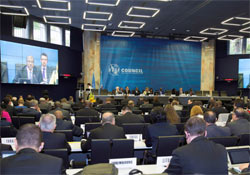
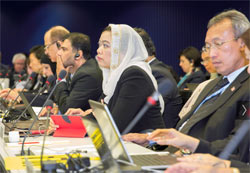
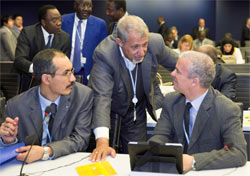
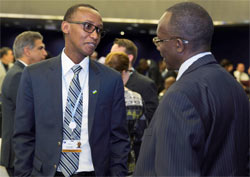
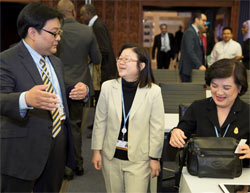
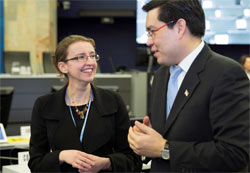
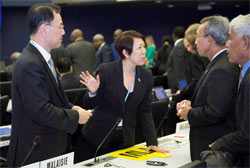
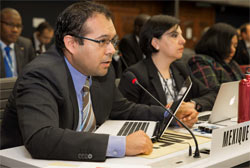
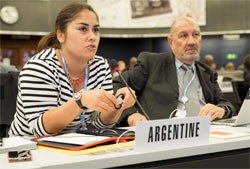
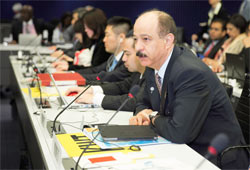
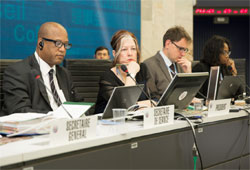
|
